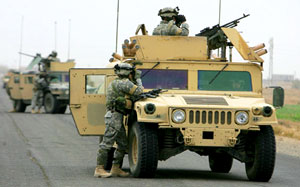By Ron Walters
-Guest Columnist-

Senator John McCain was recently on television relating that, in the 1970s he had read the Pentagon Papers (that were courageously pilfered from the Department of Defense by Daniel Ellsberg), saying that they contained evidence from high-level sources that there were “gross miscalculations” made in the conduct of the Vietnam War.
He also thought that these miscalculations that led to the war were compounded by the post-World War II philosophy of John Kennedy, who once said in a speech that we would “go anywhere, pay any price, bear any burden…” in defense of freedom.
The McCain parallel is that the so-called “war on terrorism” is this generation of neoconservatives’ equivalent to the Cold War, or the fight against global communism. But that was a very different fight. The Soviet Union consisted of states with an historically European military style, unsuited to guerilla tactics, as their loss in Afghanistan would signal.
Moreover, the Soviet Union was based, in part, on an approach to economics that could not be sustained because it depended on an ideology, rather than upon objective modern business models and macro-economic fiscal policy and monetary policy. The fall of the Soviet Union and the viability of the communist system were substantially related to these internal flaws, not to the external demand of Ronald Reagan to “tear down the Communist wall.” These problems were the targets of reforms that Mikhail Gorbachev attempted too late.
So, one of the delusions of the neocons is that they “won the war” against communism rather than it fell of its own weight. Then, they compound that delusion of American global might by inventing a new enemy the size and scope of the communist and launch a military confrontation against it, in a proxy war in Iraq.
I consider Iraq to be an invented “proxy war” because of the failure to find Osama bin Laden, the al-Qaeda leader. So, the Bush administration launched a more expansive “war against terrorism” that has the capacity to incorporate many elements in the Middle East that harbor the seeds of deep historical alienation based on the massive displacement, global embarrassment and the military defeat of the Palestinians since the end of World War II.
Then, it seeks to cleanse a conception of Islam that is retrogressive and opposes modernization of the role of women, of political equality among different groups, as essentially a cultural movement with extremist underpinnings.
The resistance counter by conducting a guerilla operation with a cultural manifestation they have turned into a popular battle against an anti-Islamic force, represented by the United States, that gives them an unending supply of regional sympathy active support.
Thus, the pursuit of a war against global terrorism in Iraq is a gross miscalculation violating all that America should have learned fighting North Koreans in the 1950s and the Vietcong in the 1960s and 1970s: you cannot win a guerilla war that is fought in a theater where the opposing force has the advantage of manpower and position.
In this sense, Operation Desert Storm was “won” by Pres. Bush’s father only because Saddam Hussein chose to fight it as a convention military war. However, top military officials have said that there is no military solution to the Iraq war–I would extend that to include the so-called War on Terrorism. The passions of ideology and fidelity to religious culture are some of the most unchangeable aspects of human nature and the attempt to overthrow them by force only invites counter-force.
One surprise for me is that, although the military officers admit the truth, the present generation of neocons is perhaps too young to respect the lessons of the revolutionary era of the 1960s and 1970s, when the determination of out-gunned, poor people caused them to withstand confrontations with superior military powers. They either fought to a draw or defeated the French, the British and the Americans in Asia, but also the Belgians and White settler regimes in India, Guinea Bissau and Cape Verde, Angola, Kenya, Zimbabwe, Cuba, South Africa and other places.
Time after time, the arrogance of the colonial or post-colonial powers led them to devalue the strength of the desire of people who wanted their own brand of freedom. People using their bodies as bombs in Iraq is only the latest sign of a desire that has destroyed the neocons’ expectations of a quick victory.
The fact that the debate has shifted to an attempt to find more realistic terms to end the proxy war in Iraq is the surest sign that the American people believe that a military victory is impossible and the neocons have compounded this problem long enough. And if “victory” in Iraq is impossible, then whither the global “war against terrorism”?
(Ron Walters is the director of the African American Leadership Institute and professor of Government and Politics at the University of Maryland College Park.)












